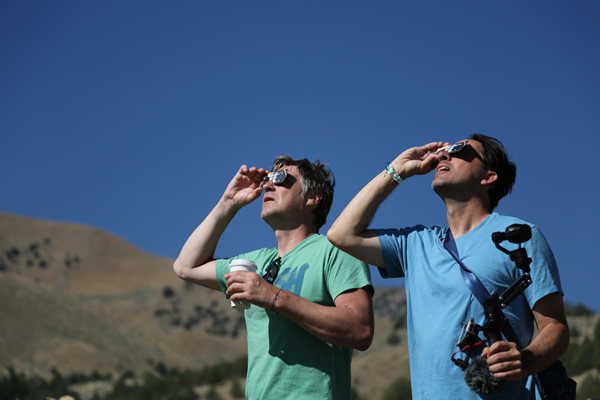Does Travel Make You “Liberal"?
Article by Robert Reid. Photos by Kim Mott.
7/17/2018
 |
|
Watching an eclipse.
|
This is going to sound a little touchy-feely. But I felt something while standing in a field in Eastern Oregon during the 2017 eclipse.
As the moon neatly blocked the sun, and the hot August temperatures started to feel air-conditioned, I watched motionless at the moon’s flaming “black eye” staring back. The moment felt timeless and comforting, and ultimately unifying for all of us sharing this tiny orb zipping through space.
This is actually a pretty liberal view of the world.
Two springs ago, I had a similar feeling in Ethiopia, where I saw the skeleton of “Lucy,” a 3.2-million-year old hominid. She’s one of humans’ oldest known ancestors. Realizing this makes a visit to Africa a sort of homecoming. (Even for a white middle-class guy who grew up in Cold War Oklahoma.)
And when the world starts to see itself more this way — as a unified “tribe,” not split by its ethnicities, nationalities, religions, persuasions — it gets along better.
(Told you it was going to get touchy-feely.)
Famously, Rick Steves calls travel a political act. In his 2009 book/documentary, Steves traveled to places where media-fed images don’t always relate to reality on the ground: El Salvador, Iran, Copenhagen collectives. He argues that such travel shows us how a U.S. election can have a bigger effect to poor people half a world away than to most middle-class Americans. As a result, you return home with an expanded version of reality.
I’d call it a liberalized version of reality.
"Liberalism"
“Liberalism” is a complicated term, and can reflect shifting tides as the term gets shaped to meet certain political goals. (Free market supporters of conservative America are championing "economic liberalism” whether they realize it or not.)
Taken at its ground-floor meaning though, “liberalism" reflects a willingness to accept different ways of doing things than your own. Which sounds a lot like a great way to travel (just like the original “Ugly American,” as I wrote about here before).
Meanwhile, those who group “the other” with a negative generalization — e.g. “sh*thole countries,” “murderers and rapists” — tend to be less lenient on individuals outside their group. They are almost always more conservative.
This split notion is addressed in David Farley’s recent take on the ongoing crisis in Syria. After meeting Syrian refugees in Berlin, the longtime travel writer and author of An Irreverent Curiosity, volunteered at refugee camps at Souda, Greece. His piece about the experience (in Afar) regards the “sober dose of reality” he felt, not any inconvenience he had over living conditions or costs.
After noting his parents had never met a Muslim, and that almost half of the U.S. agreed with Trump’s proposed travel ban, Farley writes, “If only those who agree with Trump could meet the people living at Souda, I thought.”
Doing so, in other words, would liberalize their point of view.
Empathy
In late 2016, shortly after the last U.S. presidential election, I spotted a troubling flurry of articles supporting an “anti-empathy crusade.”
The leader, Paul Bloom (author of Against Empathy), segregates any notion of compassion or sympathy (feeling bad for someone) from empathy (actually matching the feeling of someone). To Bloom, saying “I feel your pain” must mean actually feeling the same pain — and, for some reason, this makes him mad.
“When some people think about empathy, they think about kindness,” he writes. “I think about war.”
(Weird guy.)
I wish he’d focus less on such semantics than on a bigger picture: how to use our compassion or empathy — or whatever you want to call it — to help unify perceived differences in the first place. (And, face it, make the world a better place.)
Tribalism
Tribalism is a problem. The group dynamic — between clans, nations, ethnicities, sports fans — is a well-documented divider between different peoples.
“Our species isn’t great at reasoning,” explains Robert Wright in a recent Wired piece. “We have ‘cognitive biases’… we’re all drawn to opinions that are favored by the tribe.”
Well, maybe travel can help.
"Positive Travel Bias"
Of the dozen types of cognitive biases — e.g. “confirmation bias” is the tendency to agree with people who agree with us — there’s one bias that strikes me as potentially useful.
“Observational selection bias” occurs when we experience something new, then start noticing it more often, thus fooling ourselves into thinking the frequency has grown. (This happened to me when I bought a blue Honda Fit last year, now notice them constantly.)
Taken another way, this can become a “positive travel bias.”
When we travel and experience people and cultures different to us, they become familiar and real. When news headlines or blanket politics smear otherwise far-away issues, we increasingly recognize the individual affected. So when political leaders smear all Latin American immigrants as “murderers and rapists,” or even when a traveler calls an innocent local a “bad person,” we recognize it to be unfair, untrue, unjust.
Travel teaches us this once we've left beach resorts or hostel lounges or tour buses — and befriend locals on their own terms we return to our homes better able to put ourselves in others’ shoes. (Or, in the case of the Masai in Kenya, into their sandals made from old motorcycle tires.) We even start to see their shoes as alternate versions of our own.
We’re all sharing this little blue orb, after all.
Almost always, these conclusions will come to you. Because travel is the world’s greatest liberalizing act.
Robert Reid has written a couple dozen Lonely Planet guidebooks, talked travel on TV shows like the Today Show and CNN Headline News, and writes regularly for National Geographic Traveler. He lives in Portland, Oregon.
|
